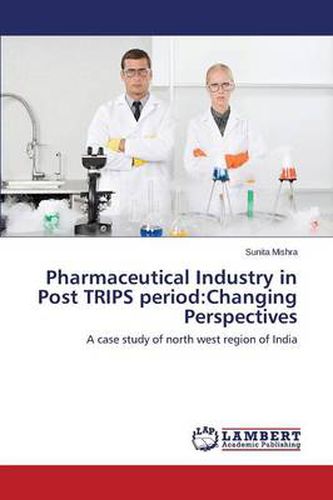Readings Newsletter
Become a Readings Member to make your shopping experience even easier.
Sign in or sign up for free!
You’re not far away from qualifying for FREE standard shipping within Australia
You’ve qualified for FREE standard shipping within Australia
The cart is loading…






This title is printed to order. This book may have been self-published. If so, we cannot guarantee the quality of the content. In the main most books will have gone through the editing process however some may not. We therefore suggest that you be aware of this before ordering this book. If in doubt check either the author or publisher’s details as we are unable to accept any returns unless they are faulty. Please contact us if you have any questions.
After India became a founder member of WTO and accepted the TRIPS agreement, It was apprehended that introduction of pharmaceutical product patents would have a negative impact on the Indian pharmaceutical industry by hampering its growth as the industry would no longer be able to manufacture by reverse engineering or export drugs whose product patents are in effect. However, the stronger patent regime proved a blessing in disguise for the Indian pharmaceutical industry. Contrary to expectations, the Indian pharmaceutical industry has shown a remarkable growth in Exports & R&D. The industry is also leading in DMF filings & ANDA filings with USFDA, a field which was not attended hitherto by the Pharmaceutical firms. The present study discusses the implications of product patents for the Indian pharmaceutical industry both at industry level and at firm level. Different databases have been used for industry level analysis as well as for the analysis of large scale firms, whereas primary data has been used to analyse the small scale firms. The Indian pharmaceutical firms’ responses provide important insights which have implications for firms from other developing countries.
$9.00 standard shipping within Australia
FREE standard shipping within Australia for orders over $100.00
Express & International shipping calculated at checkout
This title is printed to order. This book may have been self-published. If so, we cannot guarantee the quality of the content. In the main most books will have gone through the editing process however some may not. We therefore suggest that you be aware of this before ordering this book. If in doubt check either the author or publisher’s details as we are unable to accept any returns unless they are faulty. Please contact us if you have any questions.
After India became a founder member of WTO and accepted the TRIPS agreement, It was apprehended that introduction of pharmaceutical product patents would have a negative impact on the Indian pharmaceutical industry by hampering its growth as the industry would no longer be able to manufacture by reverse engineering or export drugs whose product patents are in effect. However, the stronger patent regime proved a blessing in disguise for the Indian pharmaceutical industry. Contrary to expectations, the Indian pharmaceutical industry has shown a remarkable growth in Exports & R&D. The industry is also leading in DMF filings & ANDA filings with USFDA, a field which was not attended hitherto by the Pharmaceutical firms. The present study discusses the implications of product patents for the Indian pharmaceutical industry both at industry level and at firm level. Different databases have been used for industry level analysis as well as for the analysis of large scale firms, whereas primary data has been used to analyse the small scale firms. The Indian pharmaceutical firms’ responses provide important insights which have implications for firms from other developing countries.